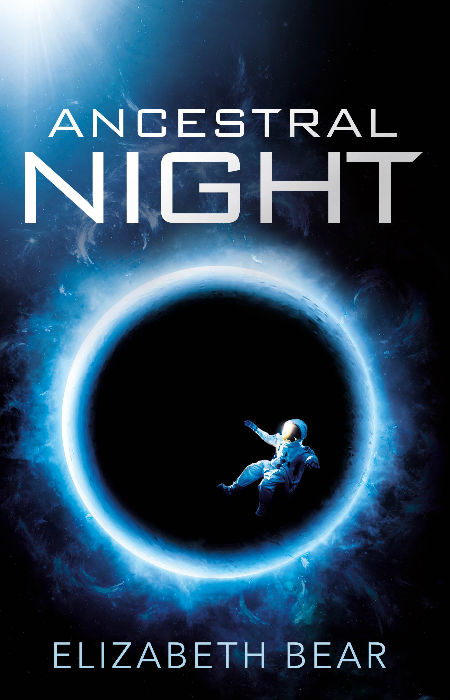
One of the inestimable delights of plunging into a really well thought out space opera is how many incredibly fascinating observations they have to make about the human condition.
That’s true of almost all science fiction to be fair, but there is something about the larger than life look (they are usually door stopping in size) and feel of a titanically-sized space opera, that grips the imagination and the mind in ways that enthrall, beguile and get you thinking deeply in a way few others manage.
Perhaps, it’s because in the very best of them, and Ancestral Night by Elizabeth Bear is definitely up there in the hallowed realms of Alistair Reynolds, Peter F Hamilton and Iain M. Banks, you are not only served up a heady dose of space adventurism that sends you hurtling across galaxies and to planet exotic and banal, but are given food for thought as the characters disclose what it is that impels to take such life-changing risks and to often attempt to save the world (or should that be worlds? Yes, definitely the latter) when no one else will.
It is, in other words, swashbuckling adventure with an ample dose of philosophising and world views, gung-ho storylines mixed in with the kind of thinking that usually occupies far more rarefied air but finds accessible expression in a future where humanity has clearly learnt to favour the cerebral over the physical.
Or, at least, pretend like they have. (Truth be told, we’re as violent as ever in most cases, as is the universe around us; some of us are just better at dealing with it than others.)
“A wide arc of stars swung below and behind Singer like the frozen skirts of a flamenco dance: the Milky Way, see from … not exactly outside, but far to one edge, and an angle. Scuttling fingers tap-dance up my spine at the sight of home, so far away. Which was ridiculous, because it wasn’t home to me – Singer was. And we were in no more danger here than anywhere else in space. Maybe even a little less than if we were camped in some cluttered, long-inhabited system full of meteors, traffic that couldn’t follow a flight plan, and poorly mapped space junk.
It’s a territorial thing, is all. There’s a sense of being long and far away from places you know your way around and have resources in that gets right up into the anxiety centers and made me feel lost and out of place.
We were off our turf, and my amygdala knew it.” (P. 7)
If there is one thing that Ancestral Night has in abundance, almost to its detriment at times, its ideas. Lots and lots of lots of ideas.
It muses at length on the systems and flaws of various systems of government – the main characters either belong to the galaxy-wide, multi-species system of utopian socialism known as the Synarche or to the Freeporters aka pirates who eschew the “evils” of technology, of “rightminding” (relatively benign social engineering done at the micro personal level; you can switch unwelcome or anti-social thoughts, impulses and feelings off at the flick of a virtual switch) and centralised government, as it does on personal vs group culpability.
The protagonist, Haimey Dz, who fled a clade as a teenager where social engineering was less benign and more Borg-like sinister, has her thoughts on both, a virtue of having been exposed not simply to the philosophical side of these ideas but to their raw expression out in the real world.
In a past that is unspooled to maximum effect throughout this mountainous tome which runs to just over 500 pages, we come to understand why Haimey has such firm ideas of lots of things even as she is willfully, delightfully down to earth and learning that planning a future and being close to her friends AI Singer and Connla Kuruscz and cats Mephistopholes and Bushyasta may not be so bad after all.
The core of Ancestral Night is essentially Haimey’s long-delayed discovery of self, of who she actually is and what she believes and wants, all set against a story which, in ways big and small, amplifies this personal quest in ways that comes to have profound effect on the future of the galaxy she calls home.

It is, by any estimation a hell of a journey that Haimey, and by extension us, on a journey from the outer edges of the Milky Way where humanity and a slew of “syster” species have formed a mutually-beneficial union of species so well run it makes the Federation look barbaric back into the core of the galaxy and far out beyond it to a place where game-changing ancient technology and secrets are everywhere.
As enticing, bigger than Ben Hur space opera premises go, the one that underpins Ancestral Night is a doozy.
It is given even more weight by Bear’s effortlessly expansive worldbuilding which simply slips all kinds of concepts and realities as if they are something which you are already familiar; she does this so well that the book, which possesses a jocular, lighthearted breeziness thanks to the witty bonhomie of its main characters (it’s a great counter balance to the book’s more thoughtful aspects), feels alive and real in a way that’s not ever weighted down by unnecessary exposition.
The Synarche and its member species just are, and it’s bliss to simply step into the world and not have it over-explained to you; it’s this kind of seemingly effortless worldbuilding that makes the world of Ancestral Night such a deep pleasure to inhabit.
You understand why it matters to Haimey and the others to fight for its existence, even if in the midst of it all, the protagonist is doing a colossal amount of soul-searching.
“And it was a lie. I was losing something: I was losing the chance to make new memories, to return to a place of safety. And no matter how philosophical I managed to pretend I was about it, that stuff was gone. I’d gotten invested in a future–despite telling myself after Niyara thta I was never going to get invested in a future with anyone or anything again.” (P. 231)
The only way in which Ancestral Night stumbles is by trying to say too much.
Just when you are expecting the action to go rocketing off in a certain direction, and it eventually does in ways that thrill and delight, it stops for yet another learned discussion.
It’s not that the subject matter isn’t fascinating; it is invariably enthralling, the kinds of ideas that make you sit up and take notice and wish you were capable of holding the kinds of discussions that the main characters do with great ease.
The trouble is that these discussions are often dense and long, slowing things to an almost-frustrating point which is a pity because the ideas themselves and the book they fill to the brim are absolutely worth your time in every regard.
Some pacing issues aside, Ancestral Night is a brilliant piece of space operatic storytelling, awash with an epic narrative, vibrant, attention-capturing characters, a great deal of witty humour to go with the sometimes ponderous philosophising and an imaginative approach to what the future of humanity may look like that will draw you in and not let you go until the very beautifully wrapped-up pages that tie things off nicely while offering a return visit that will in many ways be more than welcome.